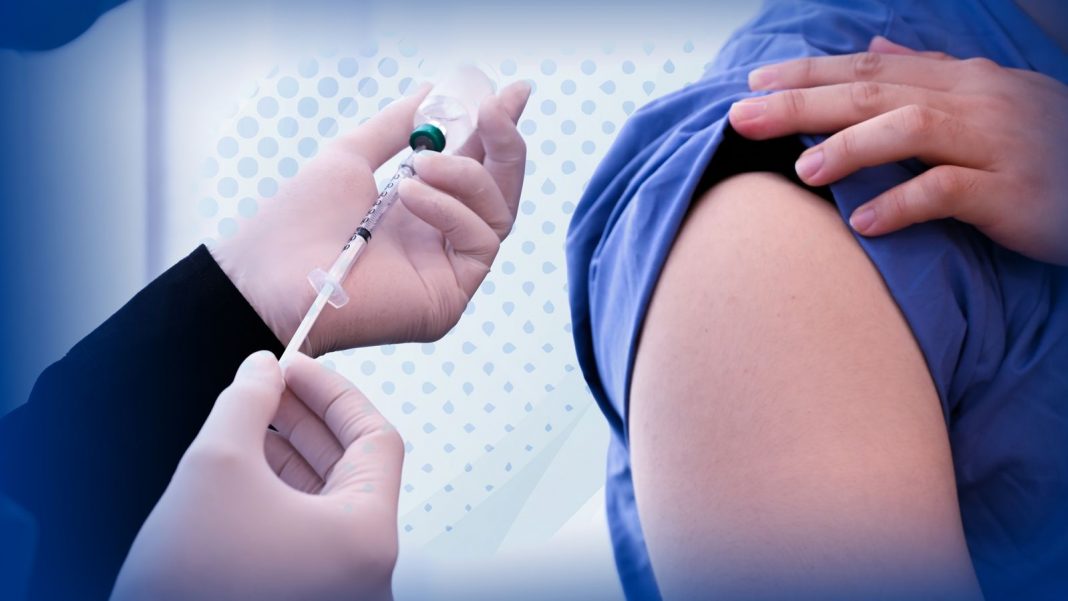Flu vaccines do a great job of limiting the number of people who end up in hospital with the illness.
Last winter, getting vaccinated cut the risk of being hospitalised by 66% in children and 25% in adults over 65.
But there are persistent misconceptions about the vaccine that put some people off from getting it.
Whether you’re eligible for the NHS vaccine, your workplace is offering jabs or you’re considering paying for one out of your own pocket, here’s what you need to know.
You can’t get flu from the vaccine
It is impossible to get flu from the flu vaccine, because it does not contain the live virus.
You might feel a bit shivery or have a slight fever – but that’s an immune response, not the flu – Professor Peter Openshaw, a virus expert at Imperial College London, told Sky News.
“It’s showing that your body is doing what it’s meant to do, which is to create an immune response against influenza, which is protective,” he said.
“So it isn’t flu, but it does have some resemblances to flu.”
It is safe to get the flu vaccine while pregnant
In fact, it is encouraged.
Studies have shown it is safe to have the flu vaccine while pregnant and pregnant women can get the jab free on the NHS.
Pregnancy changes how the body deals with infections such as flu and pregnant women are more likely to have complications if they catch flu.
If you have flu while you’re pregnant, it could cause your baby to be born prematurely or have a low birth weight, according to the NHS. In the most serious cases, it could lead to stillbirth or death.
Prof Openshaw said while he understood people’s hesitancy, “everything is positive about getting vaccinated in pregnancy”.
Not only does it protect you, but you also pass that on to your baby.
“If you get vaccinated in the later stages of pregnancy, then you will develop antibodies to influenza which you share with your baby,” Prof Openshaw explained.
“You share it through the placenta and through breastmilk, and therefore you are protecting your baby.”
Flu isn’t ‘just a bad cold’
Colds are much less serious than flu, according to the UK Health Security Agency.
You might recover from flu in two to seven days if you’re healthy “but for some the disease can lead to hospitalisation, permanent disability or even death”, the agency warns.
Some people can develop more serious illnesses such as bronchitis and pneumonia, or the flu can make existing conditions worse.
Prof Openshaw said while the flu can be mild, “it can cause very nasty disease in some people, particularly if they are at high risk”.
High-risk groups include over-65s, and people with diabetes and other pre-existing conditions, including heart and lung disease, and pregnant women.

Get a jab even if you fight off illnesses quickly
Even if you recover quickly from the flu, you may pass it on to someone more vulnerable who could become seriously ill.
You can start spreading flu a day before your symptoms start, meaning you could be walking around not knowing you are sick and making others ill.
As well as being an individual way to stop illness, flu vaccines are a public health measure that protect the most vulnerable.
You can get the flu despite being vaccinated – but your chances are lower
Even if you’re vaccinated, you may end up getting flu because the vaccine doesn’t protect against every strain.
However, your chances are significantly lowered because you’re protected against the main strains.
You could also catch a virus that isn’t the flu, but has similar symptoms – like the common cold.
If that happens “people shouldn’t be fooled into thinking that the vaccine hasn’t worked,” Prof Openshaw said.
The flu vaccine will still be doing its job to protect you against the main strains of flu and the potential complications.
Why you should get the jab if your employer is offering it
Prof Openshaw said his advice to anyone offered the flu vaccine is to take it.
That’s regardless of whether or not you are eligible for the flu jab through the NHS (more on that below).
“I think that anyone who’s offered it is going to benefit,” he said.
“The established benefits to your health of being vaccinated are so clear that there is no reason to turn down a vaccine unless there’s a specific medical contraindication, which is extremely rare.”
You need the vaccine even if you got it last year
The flu vaccine is tailored each year to the dominant strains, so what you were protected against last year might not be what your immune system will encounter this year.
The antibodies that protect you also decline over time, so you need a yearly jab to make sure you’re properly protected.
Don’t wait until the dead of winter
It is best to have the flu jab in the autumn or early winter before flu rates start increasing.
It can take 10 to 14 days before your immunity to flu is fully built up, so it’s best not to leave it until people in your office are calling in sick with it.
That said, if mid-winter rolls around and you haven’t got it, it is still worth booking it so you’re protected for the rest of the season.
Read more:
Flu and COVID jabs: Who’s eligible and when can you get it?
Universal flu jab moves one step closer
You need the jab even if you’ve had a bout of flu
The flu jab protects against several strains of flu.
If you’ve been ill, you will just have had one of those – so you still need a jab to be protected against the others.
If you’re allergic to eggs, you can still usually get the vaccine
Some flu vaccines are made using eggs, with the virus grown in fertilised hens’ eggs.
That means tiny traces of egg can be found in the vaccine.
In most cases, you can have the flu vaccine even if you have a serious egg allergy.
Special arrangements may need to be made if you have previously had a severe anaphylaxis to egg which has required intensive care.
The NHS advises people to discuss it with their nurse, doctor or pharmacist.
Most children who are allergic to eggs can receive the nasal spray vaccine, but if they needed intensive care treatment after a severe reaction to egg, they should be referred to a specialist.
There are also vaccines with a very low egg content, or no egg, available for both adults and children, Prof Openshaw said.
Most children need a flu jab
Babies under 6 months cannot have a flu jab. Between 6 months and 2 years, children only need to be vaccinated if they are in a clinical risk group (see more on that below).
Children aged 2 or 3 years on 31 August 2023 will be offered the nasal spray flu vaccine at their GP surgery.
School-aged children from reception to year 11 are also eligible for a free vaccine, which will be given at school or community clinics.
Vaccinating children prevents them from getting seriously ill and ending up in hospital, and also protects their families and wider community.
Who is eligible for flu vaccines on the NHS?
The flu vaccine is given free on the NHS to adults who:
• are 65 and over (including those who will be 65 by 31 March 2024)
• have certain health conditions including diabetes, heart disease, some neurological diseases, liver disease or a weakened immune system (for instance due to being prescribed steroids or treated for cancer)
• are pregnant
• are seriously overweight (BMI over 40)
• are in long-stay residential care
• receive a carer’s allowance, or are the main carer for an older or disabled person who may be at risk if you get sick
• live with someone who is more likely to get a severe infection due to a weakened immune system, such as someone living with HIV, someone who has had a transplant, or is having certain treatments for cancer, lupus or rheumatoid arthritis.
Clinical risk groups in children include:
• Chronic respiratory or neurological disease
• Chronic conditions of the heart, kidney, liver or digestive system
• Endocrine disorders
• Immunosuppression
• Asplenia or dysfunction of the spleen
• Serious genetic abnormalities that affect a number of systems.







